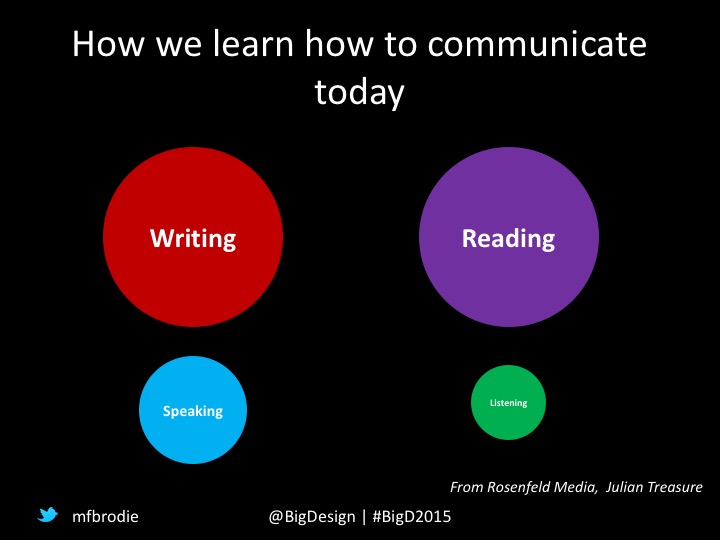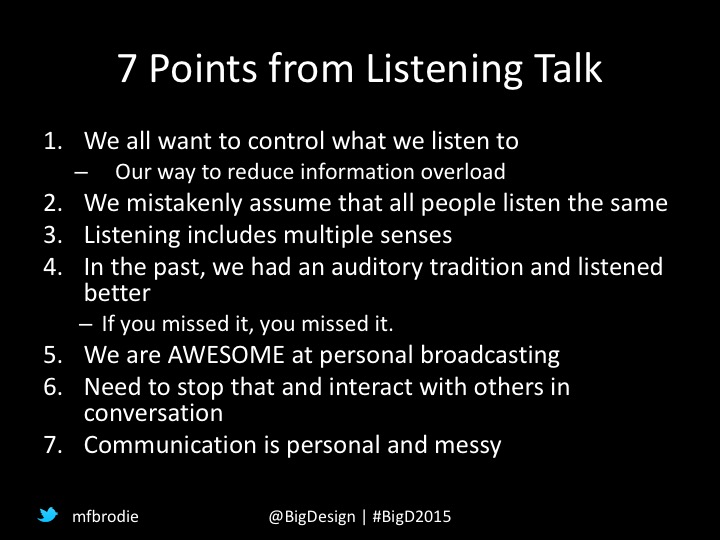Effective listening skills are some of the most important aspects of communication. Sadly, it’s an aspect that we spend little time learning. I gave a presentation this past summer about how to be an effective virtual team member. The first issue I identified for success was effective listening; the second issue was to stop multi-tasking. Multi-tasking can challenge listening (I’ll get to that in a bit).
Here’s one of my favorite slides from that presentation. It’s based on a visualization that I saw Julian Treasure present elsewhere.

He claims that we don’t spend enough time learning to listen compared to reading, writing or public speaking. It’s a shame. Listening is fundamental to understanding others and being an effective communicator.
If you are working with technology teams, listening is key to get the right solution built. If you don’t listen to understand what others are saying, you may think you heard that you are getting a Ferrari, but the team delivers a Versa.
Here are some factors why we are often challenged listeners:

Julian claims that we listen 60% of the time and retain 25% of what we hear. He attributes noise to the listening problem.
To him, noise includes conversations and machinery. However, we could broaden our definition of noise to include distractions, such as:
- phone addictions
- web
- social media
Filtering noise daily can be difficult. To listen better, Julian proposes a solution called RASA.
What is the RASA listening method?
RASA stands for Receive, Appreciate, Summarize, Ask questions.
This approach can be applied when communicating about technology from the business perspective. And this strategy works if you’re coming from the technical side too!
STEP 1 : Receive
Receiving is listening to understand what someone else is saying. If you are trying to figure out how to respond or if you are reading email or browsing social media while someone is speaking, you are multi-tasking. You aren’t focused on listening. We often see articles in publications like Fast Company and the Harvard Business Review outlining how no one multi-tasks well. I’m not sure why we insist on multi-tasking when we are so horrible at it.
True effective listening includes more than understanding what the other person is saying. There is a lot that isn’t spoken in a conversation. It’s easy to overlook gestures, facial expressions, tone of voice, and other communication aspects. This is especially true if you are on a phone call. On the phone, you can’t see gestures or facial expressions. You must rely on only tone and the words being said to communicate and understand someone else.
How does listening benefit anyone working on a technical project? If you listen without distraction, you may start to understand more about:
- How technology systems are setup and operated
- How the business and technology teams approach problems and solutions
- How they think about challenges
Understanding how the “other” team approaches problems creates a more collaborative environment. It breaks down barriers. You need to shift the conversation from telling the team what you want. It needs to evolve from “take my order” to “let’s understand each other and create a solution together.”
STEP 2: Appreciate
Affirm that you understood what was said. Besides responding “hmm, mmm” and nodding your head, try some other techniques to show that you heard someone:
- Tell the person you agree with their perspective
- Complement his or her viewpoint
- Add to the point he made
- Note that he is raising a great point
How does this apply to technical projects? Let the developers know you think that their proposed solution may work. And let them know if they are understanding how the business works or if there are gaps in their understanding. It’s only when the technology team understands how your business works that they can provide the right solution.
Also, let your team mates know if you are following the conversation. And if you aren’t following, tell them right away so they can shift their communication approach and help you understand the discussion.
STEP 3 : Summarize
This can be a deceptive practice. Have you experienced someone repeating back what you said, and although you felt heard, you later learn that the person summarizing did the opposite of what was discussed?
Technically, that person wasn’t summarizing. He was parroting. Summarizing is a tactic that allows you to repeat to the speaker what you understood him to say. This practice allows the speaker the opportunity to adjust his language to clarify how he is expressing his thoughts.
Summarizing is a great technique to use when discussing technical subjects. You can repeat to the team what you understand about the solution to get clarity in case you don’t have a complete understanding of it.
For greater specificity, draw solutions on a whiteboard or piece of paper. Technology discussions tend to get quite abstract. Everyone visualizes workflow solutions differently, based on their own experiences (it’s a common problem). Diagrams give the team something concrete to reference in the discussion and removes abstraction.
STEP 4 : Ask questions
Questions show that you are paying attention. Most people appreciate being asked for clarity about what they are communicating. It demonstrates that you are participating.
When you participate in a conversation you’ll understand more about what’s being said. Listening can be a passive activity if you allow it to be. Interacting with the speaker makes listening more interactive, more of a give and take activity.
It’s easy to feel intimidated during technical conversations. Often, the technical team will use words that the business team probably won’t understand and will strive to make sure everyone is using consistent terminology and definitions. There is a reason for this. If you don’t understand what’s being discussed, most likely that means you don’t understand what’s being built. Then, it’s highly likely the business team won’t get the solution necessary. You may experience needless rework because you didn’t ask a few questions. Everyone on a technical project understands that these projects can be difficult. The team needs to have patience to understand business or technology concepts that may be new to other group members.
Listening is an often underused, yet key, communication component. By listening to your team working on a technical project, you may avoid a lot of rework and wasted time and money. More importantly, by listening using RASA, your team will feel understood. They will feel that they are collaborating and contributing to your project – not fulfilling the role as an order taker. (Learn more about Julian Treasure.)
Interested in taking these concepts deeper? Check out our free coaching resources!
Updated: Originally posed March, 2016
Guide to Women in Leadership
Organizations with women in their executive suites regularly out-perform others. Yet rising female executives (and their mentors) are frustrated at how hard it is to break through the glass ceiling. In this extensive guide, Executive Coach Dana Theus shares her tried and true strategies to help women excel into higher levels of leadership and achieve their executive potential.







